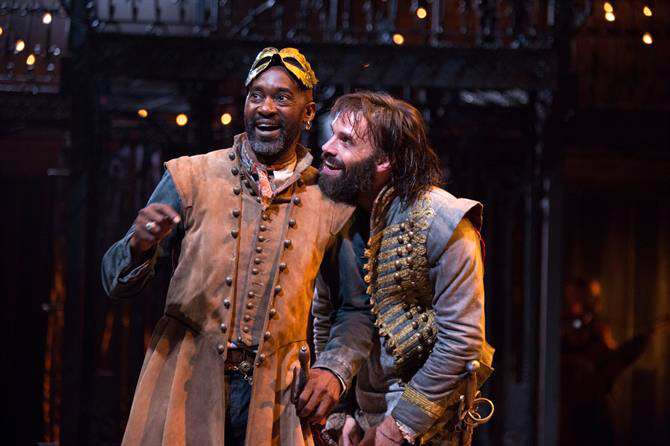
Here’s a rollicking rom-com, hot enough to dispel the coldest of autumn chills. Incredibly for a raunchy work of 1664 it was written by a women, and thankfully it’s been given a scorching touch of today by another.
Yes, Aphra Behn’s classic Restoration play The Rover – the swashbuckling hit of the Swan’s opening 1986 season – is back. Directed by Loveday Ingram and with an outrageous, captivating performance by Joseph Millson.
Behn (1640- 89) was the first professional female writer. Many of her twenty plays feature an even older profession, reflecting the hedonism of Charles II’s reign. Her origins however are obscure. She was born in Kent the daughter of a colonial official, or was he a barber? She may have travelled to Guinea, married a Dutchmen or a German and been imprisoned for debt. Certainly she spied on the Dutch for the king, lived as a free sexual spirit and had friends in high Stuart places.
The Rover is set in Naples during Cromwell’s reign. Amongst banished cavaliers eking out an existence as mercenaries, and women evading society’s restraints in the freedom of carnival. And Ingram’s coup de théâtre sets that fiesta on fire with Cuban-style music by Grant Olding and incendiary dancing. She also movingly draws out Benn’s feminist concerns, smuggled in amongst the laddish action.
It’s no wonder two sisters abetted by a kinswomen, dress as gypsies and try their romantic luck amongst the frolickers: one is facing a forced marriage, the other life as a nun. The action flows freely and intelligibly, but for detail there’s an admirable synopsis on Wikipedia.
The Rover is a swaggering naval captain, as quick to draw his sword at a perceived slight as to pursue the merest whiff of a potential sexual encounter. In Millson’s huge persona he’s half Brian Blessed, half Errol Flynn, and so energetically persuasive we forgive his calculating lust.
A hard act to follow for two true lovers but Patrick Robinson contributes attractive steadfastness and adds to the phenomenal sword play. Whilst Frances McNamee brings a modern sensibility and determined resilience to a world of female servitude.
The unsuitable candidate for the convent in Faye Castelow’s delightful portrayal, is anything but a novice at sexual politics. She dares direct her girlish longing for life at the Rover, matching his wit and charm. Instinctively she’s at home in a moral milieu, which latterly found expression in the 1940s, Lerner and Lowe song: When I’m not near the one I love, I love the one I’m near.
There’s fun to with Leander Deeny’s witless wit, intent upon a sensual night ‘worth all the days I ever passed in Essex’. Yet Behn wants you to understand, this is a violent cruel society in which the male sex refuse to understand the word no: it’s the men that gets the pleasure and the women that gets the blame.
And Alexandra Gilbreath provides the keynote of the play’s stunning duality: alluring but dispassionately professional whilst advertising her incredibly expensive services as a famous courtesan. Deeply moving in grief when she gives her ’virgin heart’ to The Rover and is betrayed. ★★★★☆ Derek Briggs 29th September 2016
The Rover continues in repertory until 11th February 2017.

